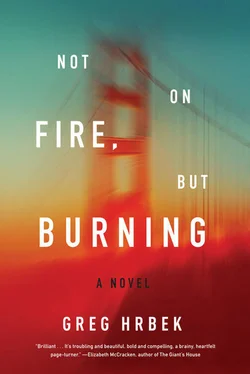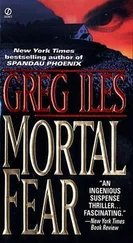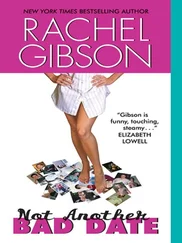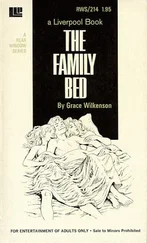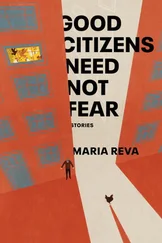“No …”
He nodded. “Where were you when it hit — indoors or outdoors?”
“In.”
“Where? What neighborhood?”
“Presidio Heights.”
“So you sheltered in for a while.”
“No.”
He didn’t seem to understand. “Well, what’ve you been doing the last two hours?”
She couldn’t speak.
“Look,” he said. “Tell me your name again.”
“Skyler.”
“Skyler. You’ve been under the plume for two hours—”
“It wasn’t that long.”
“It’s been two hours,” he said. The words sounded so final, Skyler thought he would move on to the next wounded kid and not look back at them. But he stayed long enough to change the status on Noah’s triage tag from yellow to red — and to look at her once again. Never had she seen eyes so transparent. The one pale comparison Skyler’s mind would make was to a boyfriend from the previous semester. The way he’d looked at her when she dared tell him one night: I think I love you. As if there was nothing he could say and nothing to be done for her.
They took Noah in one direction and led Skyler in another. Down the hallway of an evacuated ward. Windows blown out. The young cancer and leukemia patients had gone to the fallout shelter or acute care; and now here Skyler was, with other parents and guardians from the red group, walking over broken glass and smeared blood. She held a towel and a gown. Every shower on the ward was streaming water. She went into a bathroom and shut the door behind her; removed her clothes and added them to a pile of contaminated clothes; then stepped into the warm flow. Bowing her head, she shampooed the tar out of her hair. She went down on her hands and knees and tried to vomit directly into the drain. She had seen a land line telephone in the outer room. If it worked, she had to call them. She wanted to talk to them. But from the very beginning, blindly and whole-heartedly, like someone under the spell of ageless superstitions, she had been afraid to. She laved every inch of her skin with liquid soap and stood beneath the water for a count of sixty.
“Sky. Oh, Sky.”
“I’m okay.”
“Where are you?” her mother asked.
“I’m at a hospital …”
“Skyler.”
It was her father now. Just as she had known. Their voices. Each so loving and terrified: she wasn’t going to live through this.
“Sky, are you hurt?”
She told him no and that she was safe where she was, but it was a children’s hospital and she couldn’t stay there.
“Why not, hon.”
She was wearing the gown and her tennis sneakers. Standing by an empty bed. In the bathroom a few feet away, the next person was showering and she could hear that person throwing up. She tried to explain to her father what the doctor had explained to her. That given her proximity to the explosion, the time of her exposure, and the presentation of symptoms—
“Slow down,” her father said. “Let me talk to a doctor.”
“I don’t know where they are.”
“Sky …”
She felt faint all of a sudden and the tears in her eyes seemed very hot. Her father was talking. Suggesting she do things that made no sense. He was too far away to understand. A hundred miles north — and the bridge between here and there didn’t exist anymore, the way from here to the town she’d grown up in, enfolded by hills yellow in summer (the arrow of the wildfire danger sign set to orange) and emerald green in spring; the river beneath the redwoods, flowing west, meeting the ocean at a shore where harbor seals came to pup every spring when the hills greened.
Outside the hospital, Skyler saw that the rain was coming to an end. The black rain, people had been saying, was in fact the water of the bay, drawn up into the cloud and fallen fouled back to earth.
She had heard a lot of things in the hospital.
What was true?
If we decontaminate now, we will probably live. No matter what we do, we have a week at most. There’s another plane. Another plane went down in the middle of the country. It wasn’t a plane; it couldn’t have been, it was too bright. It was on fire. No, not fire, a burning light. Her father said: just walk, walk south, Sky, and we’ll meet you, we will find you.
She thought of something she had read in Existential Philosophy. What if a demon came to you in your loneliest moment. Said: this life, just as you have lived it. Would you choose it over and over again for all eternity? Are you strong enough to want nothing more?
She had walked two or three blocks, under a brightening sky, when she suddenly believed herself to be missing something. The boy. She stopped short. As if to go back for him. Then remembered. Not mine anymore. Skyler felt the pocket of the hospital gown for her phone and the two small tablets of morphine.
Overhead: blue of noon.
The wind had changed direction. The plume of darkness sheering east. Away from the city, toward the other cities across the bay. And the university. Most of her schoolmates had gone home for the summer, but not all; and now Skyler thought of the names and faces of the ones who had stayed, as she had stayed, though her mother had not wanted her to. In fact had nixed the idea. If not for her father’s intervention, she would’ve been home for the summer. Would be home now. She felt her lips moving and realized she was speaking aloud, barely aloud. Saying in a whisper: Mom. Mom. Don’t blame Dad. It’s isn’t his fault. It’s not anybody’s fault .
She walked miles that afternoon. Beyond the blast zone into streets where windows were still intact; through a neighborhood where someone had sketched upon forsaken vehicles — traced in the blanket of ash laid over hoods and windows (with a fingertip, she thought) — myriad peace signs; and along a wide commercial boulevard where the pharmacies and markets had been reborn as free medical clinics and food banks. She drank down a bottle of spring water. She passed a chain clothing store with its doors propped open; went in and found jeans that fit and a shirt, and rejoined the current of emigrating people. People. Seeing them at last. Complete with bloodied clothing, burned skin, cindery hair; holding hands; conveying each other in wheelchairs, shopping carts, and red wagons; helping to their feet the ones who fell; lending their phones; saying thanks to each other. So many walking together. Like the marches Skyler had been to and to which her mother had gone when she was young and her grandmother before that. Through the streets as one. Across roadways renamed for martyred leaders into the green world of the park, through the shadows and healing scent of eucalyptus trees, past the great Victorian greenhouse, into the maze of the arboretum where they seemed to hear someone, enfolded by the flora, playing a very old song on a guitar, and where Skyler offered to an elderly woman suffering the torment of beta burns one of the two tablets of morphine allotted to her at the hospital. The sun was going down over the ocean, ionized particles endowing the sky with the beauty of skies painted on the domed ceilings of cathedrals. She felt dizzy and feverish. Just for a little while, she thought, lying down on the grass, skin hurting, thinking that in a few weeks her brother would turn three. She had already made secret birthday plans. To bring him into the city, to a science museum by the bay with exhibits that played tricks on your mind and senses. There was one called the Listening Vessels. A pair of giant parabolic reflectors which focused sound in such a way that the whisper of a person seated in one reflector could be heard fifty feet away by a person seated in the opposite one, and vice versa: like reading minds across space and time.
Summer in the future. Third straight to be the hottest on record, and the first since Dorian’s birth to coincide with the emergence of the periodical cicadas. Brood X. Also known as the Great Eastern Brood. Magicicada septendecim . Dorian knows all about them from Science class. How seventeen years ago, they sang and mated by the millions; and the females, with knife-like ovipositors, scored the bark of tree branches and laid eggs in the slits. About two weeks later (by which time all the adults had died), the newborn nymphs dropped from the trees and burrowed underground — and that’s where they grew in secret, waiting for their time to tunnel to the surface … It happens one night in June, around sunset. Dorian and his friends are out at the old race track on Union Avenue. For more than a century, the town had been defined and made prosperous by the sport of thoroughbred racing. But that was back before the summers got too hot for horses to be pushed to the limits of speed and stamina. The track is in ruins now. Taken back by nature. The sandy loam and grass a jungle of weeds and brush, though a kind of trail has been forged alongside the running rail — and in the old stables still lay the bones of a racehorse named Strange Victory.
Читать дальше
